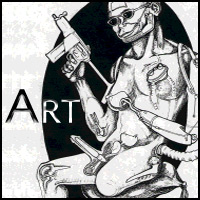
Cyborg Philosophy: Ethical Issues Concerning AugmentationDan Sharpe Today we live in a world of cyborgs--a cyborg society. Cyborgian technologies and systems pervade nearly every aspect of our modern lives. So much so, in fact, that you probably don't even notice them, or even consider them cyborgian. Indeed, there is a very high probability that you, the reader, are a cyborg and are not even aware of it. In our modern world it is no longer a question of "if you are a cyborg," but rather, "what kind of cyborg you are." I'm sure by now you are now asking yourself: "Well, just what is a cyborg, and how in the world am I one without knowing it?" For the entirety of this essay I will be using this simple, yet broad, definition for cyborg: "A cyborg is a cybernetic organism (i.e. an organism that is a self-regulating integration of artificial and natural systems)."1 On it's face this sounds like a complicated definition, and perhaps, one that gives rise to images of fantastical science fiction man-machine creatures like Terminator. But the Terminator is only the tip of the iceberg, so to speak. This definition does encompass those individuals with robotic prosthesis or augmentation. But at the same time this definition also encompasses those individuals who have been inoculated with a vaccine to aid their immune system in defending against contracting a specific disease. If you are wondering how this applies, think about vaccination this way: a vaccine is artificially created to be injected into a person (a biological system) to, in essence, re-program that person's immune system to react to a specific disease in a certain way. This definition of cyborgs also encompasses those individuals who have altered themselves through genetic modification. This means that any unborn children that are modified in the womb will likewise be cyborgs when born. But the point of this essay is not to dole out definitions. Indeed, the point of this essay is to turn a philosophical eye towards cyborgs and to our cyborg society in general. I will be examining the ethical issues revolving around augmentation, and the role of government with respect to cyborg civil rights. One of the major ethical issues that comes up when looking at cybernetic augmentation, is the distinction that is made between restorative augmentation, and augmentation for enhancement. An example of this would be contact lenses, or glasses. This is a commonly used and accepted means of augmenting one's self in a fashion that is restorative viz., that the augmentation brings one's level of ability to that of a normal human being. Let us instead take a less commonly used form of visual augmentation, e.g., the bionic eye being developed by Mark Humayun and colleagues at Doheny Eye Institute at the University of Southern California.2 Currently the bionic eye is only able to partially restore a person's vision. But it is not inconceivable that a bionic eye could one day surpass the limits of human vision. This surpassing of human limits is the other side of the coin, the augmentation for enhancement. These sorts of augmentations have some currently debated ethical issues concerning them. One specific group that is pro augmentation for enhancement is the World Transhumanist Association (WTA). Who define transhumanism as: (1) The intellectual and cultural movement that affirms the possibility and desirability of fundamentally improving the human condition through applied reason, especially by developing and making widely available technologies to eliminate aging and to greatly enhance human intellectual, physical, and psychological capacities. Now, immediately this philosophy strikes me as Nietzschean in descent. Friedrich Nietzsche was a controversial 19th century German philosopher who, among other things, advocated the "Übermensch"- the overman. We can see parallels between the idea of the Übermensch and the idea of the "Posthuman." The Transhumanist defines Posthuman as: "[...] possible future beings whose basic capacities so radically exceed those of present humans as to be no longer unambiguously human by our current standards." Compare that idea with a few quotes from Nietzsche's book Thus Spoke Zarathustra:4 "Man is a rope, tied between beast and overman--a rope over an abyss." What we can see from these quotes is that Nietzsche's overman parallels the Transhumanist's Posthuman, and that Nietzsche's man parallels the Transumanist's Transhuman. Both philosophies set their sights on a being above and beyond average humans. Both philosophies advocate an active pursuit of man overcoming himself and his limitations, which make him all too human. This point brings me to something less academic, but still philosophical--"Star Trek." More specifically, the Borg of the television series. The Borg (short for cyborg) are a race of cyborgs who, through their relentless pursuit of perfection, assimilate other races and technologies they come in contact with. The Borg are also characterized by their hive-mind kind of collective consciousness.5 This sort of conception is not new to science fiction. The premise of humans becoming obsessed with enhancement and general augmentation until they lose that which makes them human all together, is very familiar. It is a very real fear that some people have; that they, themselves, will be consumed in this fast-paced digital world. With more intimate forms of cybernetic augmentation becoming more readily available, those afraid that technology may take over their lives may also worry that technology may also invade their very bodies; leaving them "less than human." On the other side of the augmentation for enhancement debate are groups like the Center for Genetics and Society (CGS). Who state in their summary statement that: The new human genetic technologies present a threshold challenge for humanity. [...] If abused they could open the door to a powerful new eugenics that would objectify human life and undermine the foundations of human society. The CGS has at their core a certain set of values and beliefs which are religious in nature. One of these core beliefs is that there exists a perfect deity that created all of mankind. Since this deity is supposedly perfect, then it is thought that man is a perfect creation. To some, augmenting or altering man's form in any "drastic" way is seen as a corrupting perfection. Along the same line of thought since man and his form were created by some god, any "drastic" intervention, or augmentation is seen as trespassing into said god's domain; "Playing God," as it were. As an important side note; "Drastic" in and of itself is a vague term that should be fleshed out a bit. By virtue of its vague nature, one person's "drastic" could be drastically different from another's. In this context, however, I purposely used it to show the seemingly arbitrary distinction between cybernetic technologies which are "good for humanity," and those which are "Playing God." From the CGS's site: [Good technologies are defined as:] "Those that have or might have clearly beneficial uses. Some technologies or applications in this category raise social concerns, and their use should thus be regulated and controlled as appropriate." [...] [e.g.] "genetically targeted drugs, somatic gene therapies, infertility treatments, stem cell research, embryo research [...]." So again we see that the distinction is merely one of maintaining the status quo. It's not that the technologies are so very different, it is that instead the difference is one of purpose. Those that would bring you back up to the health and abilities of the average human are permissible, whereas technologies that have the possibility of transforming humans into possibly something more (or less) than human are in need of banning. Apparently you are in the clear if you are only "repairing" God's works. As soon as you begin to attempt to improve upon said deity's supposed work, you're labeled as "Playing God." There is a philosophically interesting distinction to make about the motivations of these two groups. On the one hand, you have the World Transhumanist Association, who wish nothing less than to become immortal and, if possible, truly transcend humanity through technology. On the other hand, you have the Center for Genetics and Society, who would allow some augmentation for the treatment of diseases and the like, but are vehemently opposed to any technology that might alter humanity in any "drastic" way. While both of these groups represent the more extreme ends of the bell-curve, there is a unifying force present in their motivations--fear. The WTA as a whole seems to suffer from thanatophobia, viz., the fear of one's own death. This is apparent by their goals of life extension and immortality, either of body, or by "uploading" their consciousness onto a computer. The CGS are afraid of change, not subtle change, but change that could alter humanity. Now, at face value, this may seem rational. Their reasoning, however, is that to alter human genetics in heritable ways is to jeopardize humanity with negative social change and possible extinction. Among other things, the CGS's The Minimal Critical Policy Regime states that, at the least there should be: "National and global bans on reproductive human cloning [...] [and] inheritable genetic modification." Also that there should be "Effective, accountable regulation of all other technologies of human genetic modification" in place.8 So then, the question arises: "What should government do with respect to these new augmentation technologies?" Should some technologies be banned, simply because of their possible future risks? Should the government intervene more intimately into our lives as citizens and regulate what we can, and can't do, to our bodies? Indeed, as citizens do we not own our own bodies? Today in America a person is able to get sex reassignment therapy, viz., medical procedures transgendered people may pursue, or specifically to sex reassignment surgery, which usually refers to genital surgery only.9 However, this is not before much red tape has been cut. But this is in stark contrast to the old practice of assigning a single sex to a child born as a hermaphrodite. Now this practice it is no longer the norm due to the ethical issues brought up by it. Why would it be that reassigning a child to one sex at birth, would be met with less resistance than an adult wishing to be reassigned to another sex? For the same reason that the CGS is against certain technologies: fear of change. For the reassignment of a child, it was seen as "fixing" the child, making it "normal." Whereas for an adult to want to alter its sex is considered strange. On my view a person should be able to become any sort of cyborg they so desire. In a very true libertarian sense a citizen should own their property. I see a person's body to be the most private and intimate possession, any augmentation should be completely legal and at the person's expense. In the debate cyborgian augmentation, I side more with the WTA. However, I do not share their seemingly fear based motivations. I would say that they are entitled to change their own bodies in any they see fit. As long as their personal augmentation does not hinder or hurt anyone else from being able to do the same. The government's role in all of this should not be to tell the citizen what to do with their body, but instead, to make sure that those aiding the citizen in their augmentation are held accountable for informing the citizen of any and all risks involved with their augmentation. An informed citizen is an empowered citizen. To allow government to have any say in what you can and can't do with your own body--is to give too much power to the government. It is also important to note where unborn children lie in this new libertarian stance on personal augmentation. While unborn I believe that the child-to-be is the personal property of both of the parents. As such you should be allowed to whatsoever you chose to said child. This includes, but is not limited to: aborting, genetically altering, or genetically screening the child-to-be. The governing factor here should be the parent's conscience. It is important to remember when augmenting the unborn, if they eventually are born, they are a living being. Much thought and information needs to be taken into account before one should commit to altering their unborn child. Bibliography1 "Cyborg." Wikipedia, The Free Encyclopedia. 14 June 2007, 19:45 UTC. Wikimedia Foundation, Inc. 14 June 2007 (http://en.wikipedia.org/wiki/Cyborg). |










